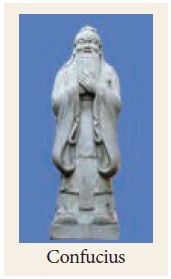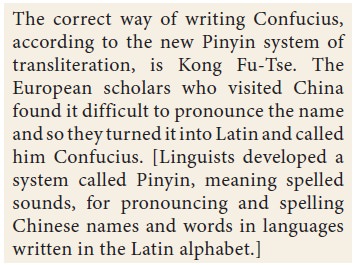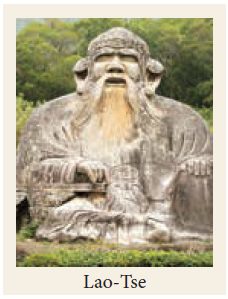History - Confucianism and Taoism | 9th Social Science : History : Intellectual Awakening and Socio-Political Changes
Chapter: 9th Social Science : History : Intellectual Awakening and Socio-Political Changes
Confucianism and Taoism
Confucianism and Taoism
In the sixth century BCE, two great thinkers were
born in China: Confucius and Lao-Tse. They laid down the systems of morals and
social behaviour for individuals and communities. But after their death,
temples were built in their memory and the philosophy they taught was developed
into a religion. Known as Confucianism and Taoism respectively, their books
were held in great reverence in China. Confucianism exerted a big influe nce on
not only the political class of China but also on the common people.
Confucius (551–478 BCE)

Confucius was born in the Shantung province of
China in 551 BCE. He studied history, poetry, philosophy and music. He is the
author of five important works: (1) The
Book of Records, which is chiefly ethical, providing guidelines for the
regulation of human society; (2) The Book of Odes, illustrating the sound
principles of morality in songs; (3) The Book of Changes dealing with
metaphysics; (4) The Spring and Autumn Annals, a code of political
morality; and (5) The Book of History narrating the events
and legends of the early religions of China.

Five Cardinal Principles of Confucius’ Ethics
1. Humaneness
2. Righteousness
3. Propriety;
4. Wisdom
5. Trustworthiness
Confucius said that wisdom grows from the family, and that the foundation of society is the disciplined individual in an orderly family. The superior man, according to him, is not merely intelligent or scholarly, but his character should be exemplary. The superior man of Confucius

possesses three virtues: intelligence, courage and goodwill.
Though Confucius insisted on children obeying parents and wife her husband, he
also clearly proposed that “when the command is wrong a son should resist his
father and a minister should resist the prince.” When asked about government,
he said that there are three requisites for it: “That there should be
sufficiency of food, sufficiency of military equipment and confidence of the
people in their ruler.”
The philosophy of Confucius gave the Chinese people
an awareness about their political rights. It also clearly listed the
government’s duty towards the people. Confucius felt that the government should
work with an ideal. In matters of national life, Confucius felt that the people
in the nation are the actual and proper source of political sovereignty. He
advised that the ruler must appoint persons of character in the government to
govern the people impartially. Confucianism is often characterised as a system
of social and ethical philosophy rather than as a religion.
Taoism
Lao-Tse, the greatest of the pre-Confucian
philosophers, was 53 years older than Confucius. Lao-Tse was born in 604 BCE.
Disgusted with the intrigues of politicians and the prevailing corruption of
his time, he left China to live in a peaceful abode. Lao-Tse wrote a book in
two parts, running into 5,000 words. He then disappeared from the place and no
one knew where he died. His book Tao Teh
Ching is a guide to the conduct of life.
Teachings of Lao-Tse (Taoism)
·
The cause of human unhappiness in the world is human selfishness. Selfishness creates unlimited
human desires, which can never be satisfied.
·
In nature, all the things act in a
natural way. The law of human conduct must correspond with nature.
·
Humans live a life under the regulation of someone. This is because they have acquired knowledge and have
not remained innocent. On the basis of their acquired knowledge, they have
built up an urban civilisation and have made themselves unhappy.
Related Topics